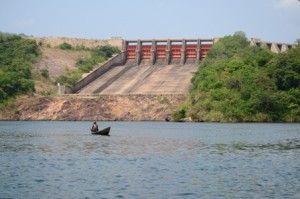Threading its way from the semi-arid scrub of the Sahel, through the lush tropical farmlands of Southern Ghana, the Volta River supports the livelihoods of millions of West Africans. It underpins much of the region’s agriculture, and is central to economic growth through hydropower generation and the provision of water for mining and aluminum production. Its waters also support productive fisheries, livestock and a growing tourism industry.
One huge piece of water infrastructure dominates the basin. Built in the 1960s, the imposing Akosombo Dam, and the huge reservoir its construction created (the world’s largest man- made lake) has given Ghana the benefits of both hydropower and relative water security. There are now plans by Ghana, Burkina Faso and the other riparian states, to build more dams to increase electricity production and expand irrigation in the basin.
The Volta’s water resources, however, are coming under increasing pressure. Local populations are growing and increased incomes and more urban lifestyles are driving up water demand.
Many analysts believe that there are sufficient water resources in the basin to deliver food security and economic growth for the foreseeable future. However, there’s one, somewhat neglected, factor that could prove decisive: climate change.
Across much of sub-Saharan Africa, policy makers continue to give climate change a low priority. That is understandable: African countries face many pressing problems and are not the main contributors of greenhouse gases. Consequently, many see climate change as a problem to be dealt with in the future. In many African countries there has been almost no systematic assessment of the possible implications of climate change for water resources and it is given little consideration in the planning of future water resources development.
However, African countries are likely to be the nations most affected by a changing climate. Countries with economies that are highly dependent on agriculture are likely to be hit hard. Weather patterns may become less predictable, exposing communities, with limited resources and limited capacity to adapt, to severe challenges. Climate change may undermine development.
In a recently published study, The water resource implications of changing climate in the Volta River Basin, a team of researchers from the International Water Management Institute (IWMI) and partners, used computer models to determine the possible impacts of one climate change scenario on the performance of existing and planned dams, irrigation and hydropower schemes in the Volta.
“We chose a particular climate change scenario known as the IPCC A1B as the basis for our study . It is a relatively conservative, but not overly cautious scenario “, says IWMI researcher Matthew McCartney. “We then combined a dynamic regional climate model, a hydrological model and a water resource model to determine the potential effects of climate change on water availability and demand, and the possible impacts on hydropower and irrigation.”
As there is also great uncertainty about the extent of future water resource development the researchers identified four development scenarios, describing different levels of development. The results of the study show that reductions in rainfall, and increase in temperature and potential evapotranspiration, anticipated by the A1B scenario, would affect both river flow and groundwater recharge. This will in turn impact the performance of existing and planned reservoirs, including Akasombo. This means that the overall performance of irrigation and hydropower schemes will decline with potentially severe implications for people and the economies of the riparian states.
“Better planning and management of water resources will be required, in particular, for water storage. Greater cooperation between the riparian states is essential”, McCartney stresses. “Considerations need to be given to integrated, transnational storage systems and innovative solutions such as managed aquifer recharge. But most important, climate change requires going beyond water, to consider other sectors as well.”
The IMPACTS WORLD 2013: International Conference on Climate Change Effects is taking place in Potsdam, May 27-30. The conference aims to develop a new vision for climate impacts research by laying the foundations for regular, community-driven syntheses of climate change impact analyses.


